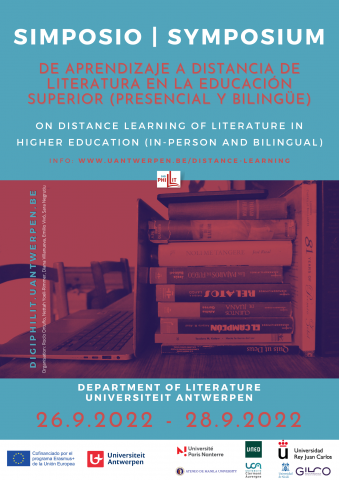

The symposium is part of the educational activities of the DigiPhiLit project, which aims to raise awareness of Philippine literature in Spanish through different means

Since March 2020 and because of the successive closures of educational institutions, university faculty have had to learn about distance learning by leaps and bounds. In this scenario, we were initially practising what has been called Emergency Remote Teaching (Charles Hodges, Stephanie Moore, Barb Lockee, Torrey Trust and Aaron Bond 2020). The length of the state of emergency and the different waves of the pandemic that in many cases have taken us back to distance classes have allowed the learning of methodologies and the establishment of certain practices after appropriate reflection, as well as the recognition of the advantages of online teaching in reaching more students and making teaching and research tasks more flexible, in addition to taking advantage of the digital resources that are proliferating in this decade. According to the Online Teaching Consortium, the difference between remote learning as an emergency measure and online learning is as follows:
● Remote learning is an emergency measure used to assure continuity of learning. It involves taking a course that was designed for the face-to-face classroom and moving it quickly into a distance learning modality (usually synchronous and held via web-conferencing tools, such as Zoom). Typically, the aim is an attempt to replicate the in-person classroom experience. Most faculty have too little training, support or time to effectively pivot their face-to-face course to one we would characterize as high-quality online learning.
● Online learning is a planned experience over weeks or months where the course has purposefully been designed for the online environment. The accompanying technology and tools have been carefully selected for the educational objectives. Faculty receive professional development and support to succeed in this modality. (National Council for Online Education 2022).
We believe that online learning has come to stay, not as an emergency measure due to the pandemic situation, nor exclusively, but coexisting with face-to-face learning and encouraged by the possibilities of scope and diversification of subjects that it offers and by its flexibility. This symposium is therefore conceived as a way of compiling these experiences, methodologies and good practices designed and acquired during this time and sharing them so that the online learning that follows the emergency is an effective, inclusive, diverse and quality learning.
The symposium is part of the educational activities of the DigiPhiLit project https://digiphilit.uantwerpen.be/ , which aims to raise awareness of Philippine literature in Spanish through different means, including through the creation of a MOOC. Therefore, priority will be given to proposals that have to do with the teaching of literature in the university environment, and its particular problems: the encouragement of reading and participation, the use of digital resources, plagiarism or evaluation are some of them, but there will also be room for issues related to more generic methodologies related to online learning such as the creation of visual aids, capturing the attention of students or the writing of scripts for video lectures.
This is specified in the following lines of interest:
● Online teaching of literature in higher education institutions.
● Distance methodologies of literature in higher education institutions.
● Synchronous and synchronous classes of literature in higher education institutions.
● Flipped-classroom and distance teaching of literature in institutions of higher education
● The construction of MOOCs
● Distance teaching of literature in special contexts: rural areas, hospitals, prisons, and so on.
● Solutions to problems of teaching literature at a distance (both methodological and circumstantial, e.g. related to bandwidth).
● The screen and the student body: ways of interacting and maintaining interest in the literature class in higher education institutions.
● Writing scripts for video lectures
● MOOCs and multimedia
